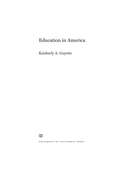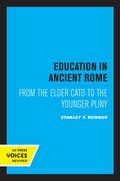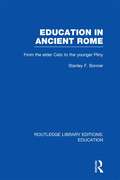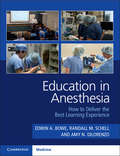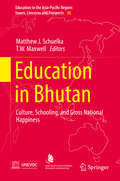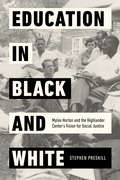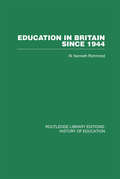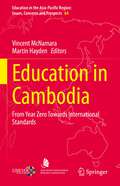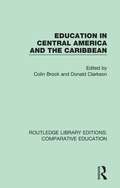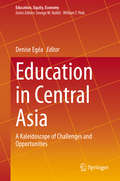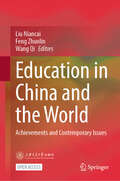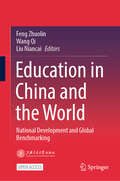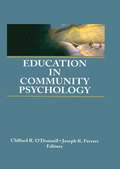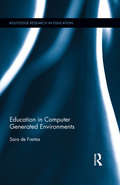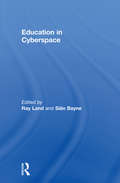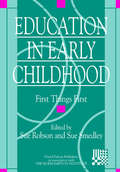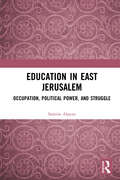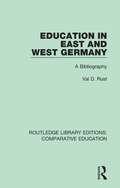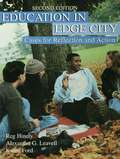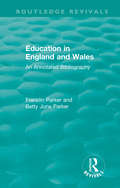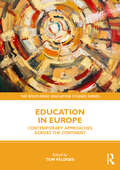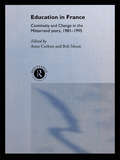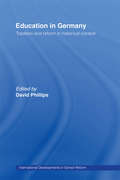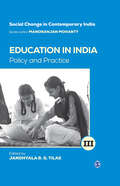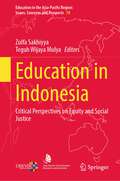- Table View
- List View
Education in America
by Kimberly A. GoyetteEducation in America provides an essential, comprehensive introduction to education in the U.S., from its origins to its contemporary manifestations. Focusing on social inequality, Kimberly A. Goyette calls into question Horace Mann’s famous proclamation that education is the “great equalizer” and examines how education stratifies students based on socioeconomic background, race, and gender. She identifies the 'hidden curriculum' beneath equations and grammar rules, from which students may learn what is expected of them based on their anticipated roles in society. Referencing school reforms such as No Child Left Behind, Race to the Top, and Common Core, Goyette shows that education is not merely reflective of a society’s views, but instrumental in shaping and changing society’s structure.
Education in Ancient Rome: From the Elder Cato to the Younger Pliny
by Stanley F. BonnerThis title is part of UC Press's Voices Revived program, which commemorates University of California Press’s mission to seek out and cultivate the brightest minds and give them voice, reach, and impact. Drawing on a backlist dating to 1893, Voices Revived makes high-quality, peer-reviewed scholarship accessible once again using print-on-demand technology. This title was originally published in 1977.
Education in Ancient Rome: From the Elder Cato to the Younger Pliny (Routledge Library Editions: Education)
by Stanley BonnerThis volume examines the development, structure and role of education from the third century B.C to the time of Trajan, a period which saw great changes in Roman society. When originally published it was the first complete review of the subject for half a century and was based on a new collection and analysis of ancient source material. The book is divided into three parts. The first provides historical background, showing the effects upon the educational system of Rome’s transition from a predominantly agricultural community to a great metropolis; it traces the development of primary, grammar and rhetoric schools, and discusses educational standards both in early Rome and under the Empire, when advanced teaching was more widely available, but often adversely affected by weakening social values and diminished parental control. The volume goes on to describe the physical conditions of teaching – accommodation, equipment, discipline, the economic position of teachers and the fee-paying system, and the part played by the State. Finally, he gives a full appraisal of the standard teaching programme, from the elementary study of the three Rs, to the theory and practice of rhetoric, in which the needs of the future advocate were constantly borne in mind.
Education in Anesthesia: How To Deliver The Best Learning Experience
by Edwin A. Bowe Randall M. Schell Amy N. DiLorenzoDo you want to improve your teaching skills in graduate medical education? <P>This book provides suggestions and practical examples for teaching in the Pre-Anesthesia Clinic, the Operating Room, the Pain Clinic, and the ICU. Designed to help the reader become a more efficient and effective teacher, it also provides best practice suggestions for teaching airway management, regional anesthesia, transesophageal echocardiography, and newer technologic advancements such as point-of-care ultrasound. <P>Based on research in education, this book provides information for all medical educators, including creating the optimal learning environment, teaching clinical reasoning, using multimedia and simulation, making the classroom interactive, and the significance of test-enhanced learning, while presenting specific examples of each. <P>Chapters include teaching professionalism, preparing residents to be teachers, teaching quality and safety, providing feedback, and teaching residents how to read the literature. This volume emphasizes providing practical suggestions from recognized leaders in each of the areas discussed.<P>Provides practical suggestions for ways to teach specific techniques such as airway management, point of care ultrasound, transesophageal echocardiography and regional anesthesia.<P> Discusses results of the most recent research in education, offering practical suggestions on optimizing and enhancing the educational experience.<P> Emphasizes the importance of the learning environment, clinical reasoning, the interactive classroom, time efficient teaching, and other necessary skills, while providing practical examples of ways to optimize each.<P>
Education in Bhutan
by Matthew J. Schuelka T. W. MaxwellBhutan is a country in the Himalayas with a relatively new education system and a unique governmental philosophy known as Gross National Happiness. This book explores the history, culture, challenges, and opportunities of schooling in Bhutan. It discusses topics including historical perspectives on Buddhist monastic education, the regional and international influence on educational development, traditional medical education, higher education, and the evolution of Bhutanese educational policy, to name but a few. It also investigates contemporary challenges to schooling in Bhutan such as adult education, inclusive education, early childhood education, rurality, and gender. Throughout the book, the developmental philosophy of Gross National Happiness is explored as a novel and culturally vital approach to education in Bhutan. The majority of the authors are prominent Bhutanese scholars and educational leaders, with select non-Bhutanese international scholars with strong links to Bhutan also contributing. This book is a valuable resource not only for those specifically interested in education in Bhutan, but for anyone with an interest in South Asian studies, general Asian studies, educational development, comparative education, Buddhist education, and the Gross National Happiness development philosophy.
Education in Black and White: Myles Horton and the Highlander Center's Vision for Social Justice
by Stephen PreskillHow Myles Horton and the Highlander Folk School catalyzed social justice and democratic education For too long, the story of life-changing teacher and activist Myles Horton has escaped the public spotlight. An inspiring and humble leader whose work influenced the civil rights movement, Horton helped thousands of marginalized people gain greater control over their lives. Born and raised in early twentieth-century Tennessee, Horton was appalled by the disrespect and discrimination that was heaped on poor people—both black and white—throughout Appalachia. He resolved to create a place that would be available to all, where regular people could talk, learn from one another, and get to the heart of issues of class and race, and right and wrong. And so in 1932, Horton cofounded the Highlander Folk School, smack in the middle of Tennessee.The first biography of Myles Horton in twenty-five years, Education in Black and White focuses on the educational theories and strategies he first developed at Highlander to serve the interests of the poor, the marginalized, and the oppressed. His personal vision keenly influenced everyone from Rosa Parks and Martin Luther King, Jr., to Eleanor Roosevelt and Congressman John Lewis. Stephen Preskill chronicles how Horton gained influence as an advocate for organized labor, an activist for civil rights, a supporter of Appalachian self-empowerment, an architect of an international popular-education network, and a champion for direct democracy, showing how the example Horton set remains education’s best hope for today.
Education in Britain Since 1944
by W Kenneth RichmondOriginally published 1978.This volume examines the purpose and the functioning of the present education system inthe UK and when it was originally published it was the first overall review of developments in British education since the 1944 Education Act. It discusses some of the most significant reforms which have stemmed from developments in the primary schools, in particular from the adoption of child-centred and progressive methods of teaching.
Education in Cambodia: From Year Zero Towards International Standards (Education in the Asia-Pacific Region: Issues, Concerns and Prospects #64)
by Martin Hayden Vincent McNamaraThis book is the most comprehensive account yet published about the education system in Cambodia. It covers all system levels and draws upon the knowledge and insights of a wide range of leading Cambodian and foreign scholars. The book focuses on how the system has developed and is making progress. Significant achievements over the past two decades are evident, but many problems remain, including the poor quality of teaching, research and institutional management. Under-funding is an ongoing obstacle, but so too is a bureaucratic culture of resistance to change, a history of weak governance, and an anti-reform sentiment deriving from a teacher-centred and exam-driven curriculum. Achieving international standards must now be the system’s highest priority. To this end, the system must rid itself of conservatism, complacency and manipulation by parochial vested interests.
Education in Central America and the Caribbean (Routledge Library Editions: Comparative Education)
by Colin Brock Donald ClarksonOriginally published in 1990. The Caribbean basin is an extremely diverse area in geographical, ethnic and cultural terms. Its educational systems, too, are remarkably varied, reflecting colonial and religious traditions as well as those of a broad range of post-independence movements. Even these show a pronounced merging of the home-grown and the foreign, with the influence of the superpowers never far away. This book comprises a number of case studies ranging across the Caribbean region. The contributors focus in particular on Puerto Rico, Cuba, Jamaica, the British Virgin Islands, Mexico City, Central America, Costa Rica and Venezuela. By assembling studies from diverse cultural and political traditions and networks, the book gives a more comprehensive Caribbean perspective on education than has hitherto been available.
Education in Central Asia: A Kaleidoscope of Challenges and Opportunities (Education, Equity, Economy #8)
by Denise EgéaThis book brings together internationally prominent scholars renowned for their work on post-Soviet republics, as well as outstanding emerging scholars native of Central Asia in order to discuss the state of education in the Central Asian Republics of Kazakhstan, Kyrgyzstan, Tajikistan, Turkmenistan, and Uzbekistan. Drawing on their individual contexts and research, the authors offer analyses and critiques of some of the social, political, and economic issues in education in their respective countries, and some insights about how local actions engage with the challenges and problems, as well as with the possibilities and opportunities they face. Since gaining their independence in 1991, the five republics of Central Asia have been undergoing some enormous political, social, linguistic, cultural, and economic changes, even as we write. This collection shows that researchers are increasingly interested in exploring the development of education in this part of the world. In these countries, education plays a significant role in transitioning from centrally planned to market economies and is seen as the key resource to facilitate entry into the global competitiveness sphere. This book will be of particular interest to educators, researchers, and policy makers engaged in research or with a particular interest in curricula, and education systems and reforms, and to undergraduate and graduate students studying and researching education in Central Asia or in other post-Soviet contexts.
Education in China and the World: Achievements and Contemporary Issues
by Qi Wang Niancai Liu Zhuolin FengThis open access book provides a comprehensive overview of education in China, covering 12 critical topics including basic education, higher education, professional education, STEM (Science, Technology, Engineering, and Mathematics) education, mental health education, and international education and excellence initiatives. Drawing from current research, theoretical literature, and real-life stories, this book examines the developmental trajectories, achievements, and best practices in the above-mentioned topics, to reflect realities of education transformation in China. It also incorporates a global comparison of key indicators to explore strengths of and gaps in Chinese education with its global counterparts. Setting its context in an ever-changing world, this book intends to explore conceptual support to develop “a modern education system with Chinese features and world standards”, to provide implications for further developing quality education in all sectors, and to promote understanding and inspire critical discussion on education development in China and around the world. This book serves as a valuable resource for students, scholars, and policy makers in the field of education studies, as well as for the general public who are interested in Chinese education.
Education in China and the World: National Development and Global Benchmarking
by Qi Wang Niancai Liu Zhuolin FengThis open access book is the second edition of Education in China and the World: Achievements and Contemporary Issues. It builds upon the commitment to provide a comprehensive analysis on education in China to a global audience. Focusing on seven education segments, from basic to post-secondary education, this edition draws on the latest literature, official data, and statistical resources to reflect the trends and development in Chinese education. Based on the groundwork built previously, this edition further explores the excellence index to assess Chinese education as compared to its international counterparts. It also provides updated influential case studies of educational practices and inspiring educators and renews a comprehensive literature review on current research and national policy, to support the development of a modern education system with Chinese characteristics and global standards. The featured analysis in this edition highlights China’s significant growth in education attainment and research output, underscored by substantial government support. Concurrently, the analysis also reveals disparities in quality performance, particularly in educational resource allocation. It calls for further efforts to promote academic excellence and to address public educational needs comprehensively. This book serves as a valuable resource for students, scholars, and policy makers in the field of education studies, as well as readers who are interested in Chinese education.
Education in Community Psychology: Models for Graduate and Undergraduate Programs
by Joseph R Ferrari Clifford R O'DonnellA useful guide on education in the field of community research and action, Education in Community Psychology explores curriculum issues regarding coursework, field training, the status of research, and the need for promoting a multidisciplinary perspective. For your easy reference, it gives you a thorough overview of the kinds of undergraduate and graduate courses available and of freestanding and interdisciplinary graduate programs in both North America and New Zealand. For your convenience, it also covers the types of knowledge and skills taught in these courses and programs, the professional roles open to community graduates, how programs can work with community organizations, and the steps and issues you should consider when planning a community psychology course or program. From this book’s helpful pages, you will discover why interdisciplinary programs hold the most promise for innovation in graduate education, as well as the greatest potential for developing community research and action into an interdisciplinary field. If you are interested in setting up a program that helps students develop a ‘systems perspective’in the way they approach problems and issues in the community, Education in Community Psychology will help you get started. To this end, you learn about: the issues and strategies in teaching community psychology to your students practical steps for developing your program how to secure viable field placements for your students how your community psychology program can train psychologists in nontraditional roles suited to address human and social problems the ecology of masters’programs selecting required readings trends in interdisciplinary training using social functions that include faculty, students, and community agencies to develop collaborative working relationships the change in APA guidelinesEducation in Community Psychology provides community psychology professors and graduate students, psychology undergraduates intending to go to graduate school, and educators in human development and social work with a practical overview of the field of community research and action, its values, ethics, theories, and methods. With its sample course outlines, recommendations for faculty planning, and insights on how to develop community psychology programs, you will be able to extend your skills beyond the classroom and into the community, where it counts.
Education in Computer Generated Environments (Routledge Research in Education #104)
by Sara de FreitasThis book examines the implications of computer-generated learning for curriculum design, epistemology, and pedagogy, exploring the ways these technologies transform the relationship between knowledge and learning, and between teachers and students. It argues that these technologies and practices have the potential to refocus on the human factors that are at the center of the learning process.
Education in Cyberspace
by Ray Land Siân BayneThe use of online learning environments is now widespread, and there is a wealth of literature providing practical advice on how to teach online, develop courses and ensure effective pedagogical practice. What has been frequently overlooked is the insight offered by cyberspace theory, which considers broader social, cultural and theoretical contexts within which new technologies and learning models are situated. This book provides a fresh perspective on current thinking in e-learning. It challenges orthodox assumptions about the role of technology in the teaching and learning of the future, and explores more varied and wider-reaching conceptual frameworks for learning in cyberspace. Featuring the contributions of respected and experienced experts with a wide range of perspectives, Education in Cyberspace will be valued by anyone closely involved in the theory of e-learning and education.
Education in Early Childhood: First Things First (Roehampton Teaching Studies)
by Sue RobsonThis work, designed to be used as a basic textbook for student teachers taking B.Ed and PGCE initial training courses: provides an accessible but rigorous treatment of early childhood education, integrating ideas and practice; acts as a springboard for students' further study; arose out of the concerns and needs expressed by students themselves; and has been written from a well-known centre for early childhood studies. Practitioner examples are included throughout, together with selected readings.
Education in East Jerusalem: Occupation, Political Power, and Struggle
by Samira AlayanEducation in East Jerusalem gives a voice to the residents of East Jerusalem, addressing educational issues and revealing implicit layers in Israeli policy and attitude affecting the education system. In this close examination of school life under occupation, the book presents criticism of the system from within, and calls for teachers to prioritize pupils’ needs. Uncovering a complex daily reality experienced in schools by principals, teachers and pupils, this book presents new findings, focusing on system-internal properties which manifest the macro effects inside the microsystem. The author draws on field studies and content analysis to show a need for educational action and suggest ample room for improvement. This study reveals that there is a significant relationship between the failures of the education system in East Jerusalem and the strategies implemented by the state, and outlines the responsibilities of the state. This book will be of great interest to academics, researchers, and postgraduate students in the fields of educational policy, sociology of education, and Middle East studies.
Education in East and West Germany: A Bibliography (Routledge Library Editions: Comparative Education)
by Val D. RustOriginally published in 1984. This annotated bibliography is a comprehensive record of English-language materials which focus on Education in the Federal Republic of Germany (FRG) and the German Democratic Republic (GDR). It provides an excellent resource to scholars, beginning with a long introductory chapter about the role of education, formal and non-formal, in the two Germanies. The socio-historical context is presented but also the authors offer discussion of educational research trends. The bibliography is structured in useful thematic chapters and within the categories then split into those relating to East and West Germany.
Education in Edge City: Cases for Reflection and Action
by Karen Ford Reg Hinely Alexandra LeavellThis volume is an extended case study of a hypothetical school district--its residential communities, a middle school and secondary school, its students, teachers, administrators, parents and board members. An integrated series of cases, all dealing with characters and situations within the school district, it offers a realistic picture of what teaching is really about. Case activities increase readers' awareness of the professional aspects of teaching, and provide opportunities for teacher reflection and decision making and for dealing with the consequences of teacher actions. Chapters 2-15 include "Questions for Reflection and Discussion," "Class and Individual Projects," and "Questions Based on Activities." Most chapters conclude with "Additional Teaching and Learning Skills" and "Suggestions For Further Reading."
Education in England and Wales: An Annotated Bibliography (Routledge Revivals)
by Franklin Parker Betty June ParkerOriginally published in 1991, this title was begun just before passage of the Education Reform Act of 1988 (ERA 88), which was implemented in the 1990s. This major act along with still-in-force provisions of the 1944 Education Act (with its 17 amendments) comprises the statutes governing education in England and Wales. The study reflects both the criticism and the praise showered on that important legislation, particularly in the Brief History and School Structure sections, and in Chapter 1 with its longer than usual annotations on ERA 88.
Education in Europe: Contemporary Approaches across the Continent (The Routledge Education Studies Series)
by Tom FeldgesThis key text offers a detailed exploration of the wide range of theoretical approaches to theory, practice and research in Europe and how these can illuminate our understanding of contemporary education systems. Contributors working or living in countries across the continent offer their insights into different histories and contemporary problems, with each chapter exploring key themes and concepts to provoke critical thinking and discussion. Key areas and debates examined include: Educational poverty Perspectives on democracy and citizenship Theorising education and educational research Epistemic injustice in the curriculum Educational provision and ethos Drawing on these wide-ranging themes across a number of national contexts to provoke critical thinking and reflection, each chapter also includes discussion points and further reading. This book is most suitable for students working towards their BA or MA in Education Studies or other education-related courses. It also offers a worthwhile resource for lectures and researchers engaged in the topic of international education.
Education in France: Continuity and Change in the Mitterrand Years 1981-1995 (International Developments In School Reform Ser.)
by Bob Moon Anne CorbettIn common with most industrialised countries, France has undertaken an ambitious programme of education reform over the last fifteen years. This book uses key extracts from contemporary writing to examine exactly how and why that process has happened, focusing on all stages of the education system. Sections cover the main characteristics of school reform in France, its aims and objectives, a discussion of the desirability of and politics surrounding the reform process, and explorations of classroom practice, the changing role of parents, standards in schools, and the curriculum. Because of its high quality, wide and up-to-date coverage of the area, this book will be a vital reference text for all those working in this field.
Education in Germany: Tradition and Reform in Historical Context (International Developments In School Reform Ser.)
by David PhillipsThe German education and training system has been the subject of considerable attention from other nations, and has often been used as a model. David Phillips' book brings together articles from some of the best known names in the field including Mitter, Glowka, Hearnden, Fuhr, Robinsohn and Prais and wagner. The book is organised into four sections. Section one examines the historical inheritance of the present education system. Section two covers standards and assessments and section three discusses vocational education and training, and area of the German education system which has received much admiration. Finally, and crucially, section four addresses questions about the future of the current system in a unified Germany.
Education in India: Policy and Practice (Social Change in Contemporary India)
by Jandhyala B. G. Tilak Manoranjan MohantyEducation in India: Policy and Practice presents trends in shifting education policies in independent India and how the State, academia and civil society reacted to the changing priorities during the last 50 years. The 20 chapters, authored by eminent scholars and experts, provide valuable insights into complex policy issues at the grassroots as well as macro levels. The book discusses major challenges and concerns such as growth and inequalities, education of women, quality of higher education and research, and making policy reforms for the transformation of the system in such a way that it helps in broader social transformation. The issues analyzed have also been taken up in the editor’s introductions, which provide a perspective on their wider social, political and economic implications in detail. This volume is an important reference tool for grappling with the challenges of the new National Education Policy 2020. The series ‘Social Change in Contemporary India’ brings together key texts published in the prestigious journal Social Change, from 1971 till present times. These writings, most of which are considered canonical, address important issues in health, education, poverty and agriculture with special focus on disadvantaged groups. These writings will help readers identify key points in the history of policymaking in India and major discourses and debates and their impact.
Education in Indonesia: Critical Perspectives on Equity and Social Justice (Education in the Asia-Pacific Region: Issues, Concerns and Prospects #70)
by Zulfa Sakhiyya Teguh Wijaya MulyaThis book offers a critical analysis on Indonesian education by drawing from various critical perspectives and theoretical frameworks to explore persistent challenges and social inequality problems in the education sector. Critical perspectives are important to reveal how education is not a neutral, mechanistic process of cultivating the knowledge and skills of future generation. Instead, it is a battleground in which competing visions, ideologies, discourses, religious values, and political interests struggle for dominance in a given society. In each of the sections, contributors draw upon specific case studies and employ critical theories to analyze power relations or to identify and destabilize underlying structures, dominant discourses, hegemonic knowledge, policies, or practices. Some authors also highlight data evidencing inequities, inequalities, or injustices in Indonesian education system. As a handbook, the emphasis on critical perspectives is useful to identify and evaluate the ‘blind spots’ of dominant policy discourses and their pedagogical consequences. The plurality of critical approaches also means that this book is necessarily multidisciplinary. A unique feature of this book is the fact that most authors are Indonesian academics who bring with them tacit knowledge of practices and issues. Overall, this book enriches the literature by bringing together different disciplinary perspectives such as political science, psychology, international relations, economics, and linguistics to critically examine important issues related to education in Indonesia.
